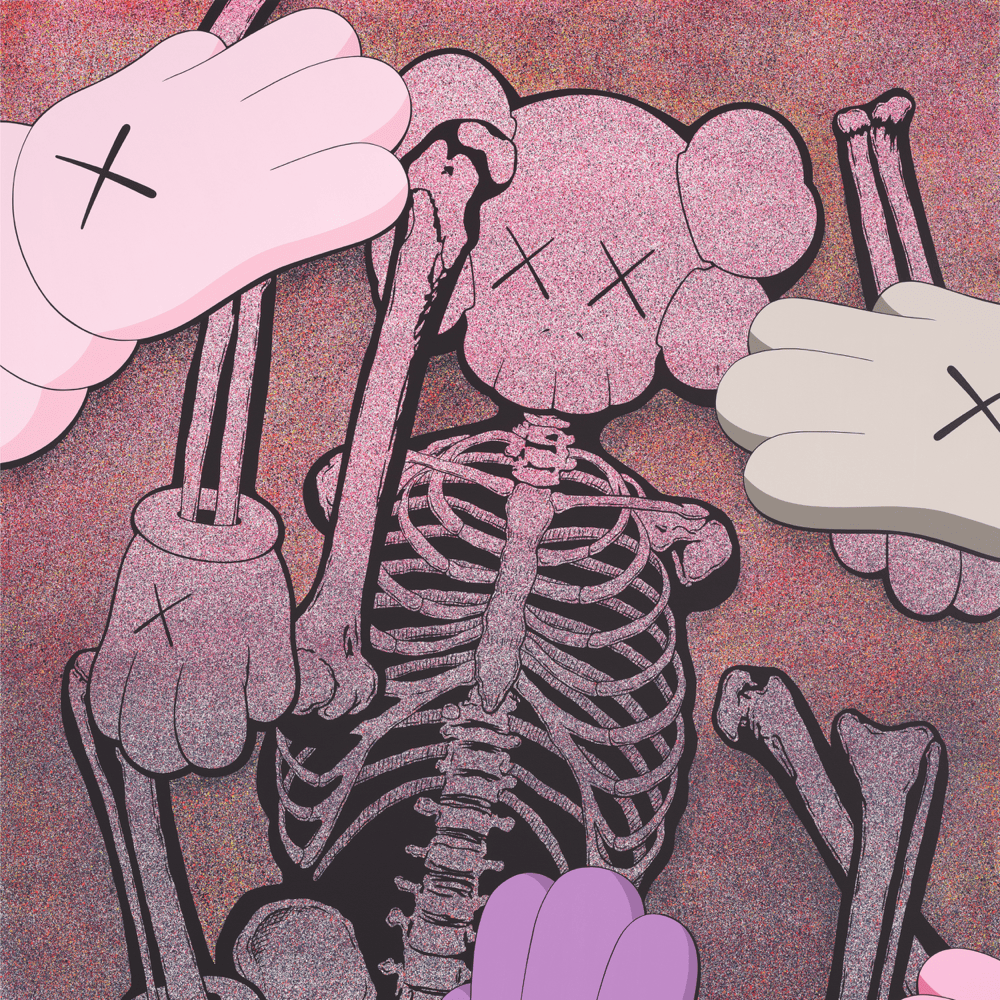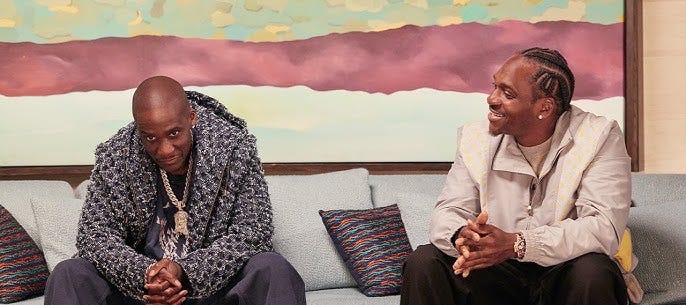Modern Review: Let Go Sort 'Em Out
The Virginia duo return from a 16-year hiatus grey, gamey, and leaning on the "wow factor" of their return over their storied continuity.
Released: July 11th, 2025 | Roc Nation
Score: 🔗🔗🔗
5,694 calendar days separate the releases of the Clipse’s botched farewell 2009 ‘Til The Casket Drops and their brash pop art comeback record Let God Sort ‘Em Out. For 16 years the cocaine enterprising Brothers Grimm went their separate ways, broken apart by the frustrations of label bureaucracy and the stress of watching federal agents pick apart their friend group. In the darkest times eldest brother Malice turned to God to become a pastor, separating his spirit from an industry looking to control it, while lil bro Pusha T was left alone to face a rap ecosystem rapidly changing into something he never imagined.
Pusha stayed in the limelight, spending a decade-plus trying to inject stability into Kanye’s G.O.O.D. Music operation while dedicating side missions to blowing down Drake, Lil Wayne, and Birdman's house of cards, driving him to near madness. He was enraged that the game devolved into one where he was an outlier, perturbed that he had to go it without his paternal partner, repulsed by who were considered his peers, and Malice was always the one to get the “you’re not gonna believe the day I just had” call.
Now free from his position as President of G.O.O.D. and having taken time to reflect, it’s easy to understand the vitriol that’s fueled Pusha T in the weeks leading to Let God Sort Em Out. For three months Push, with short icy accords from Malice, has channeled his patented venomous disgust into answering questions from every big tent journalist in America. It’s jarring to see a rapper still held in high regard empty the clip so freely. He called Travi$ Scott a “whore” in GQ, belittled Kanye's manhood with Elliott Wilson, and accused UMG of colluding against him to appease Drake to the New York Times, all while praising Jay-Z and Roc Nation for allowing their art to be released unedited after buying their way out of their Def Jam contracts.
As much as Pusha and Malice are ornery old guys frustrated with the long-term effects of their culture being pimped for parts, they also understand their path; to be elders, carriers of a covenant where artistic expression and street ethics intertwine. Bearing this cross makes every step toward rap’s moral rot feel like a personal attack. If you ask them, those 5,694 days between their albums have brought their beloved hip-hop culture closer to extinction, dragging old-world principles like morality, self-respect, and honor with it.
In theory, this multi-month pooh-poohing of modern hip-hop culture is to clear the decks for Let God Sort ‘Em Out to rain down and wash away the frauds, to remind fans and artists alike where the gold standard lies. Rappers, producers, designers, journalists, this is your call to arms! Vultures be gone! Raise your enamel-free pee pee colored diamond pendants to the sky, the Clipse are back!
Now that the unimaginable shock of a proper Clipse reunion has become reality, we’re left with the truth; Let Go Sort ‘Em Out sounds like a record made by guys who haven’t worked together in 5000+ days. It’s a clunky spectacle held together by Malice's heroic return rather than a showcase of continuity and bespoke taste. The lockstep Push, Malice and Pharrell have always had with one another feels broken, clicking in unison only for short bursts.
Everything starts with Pharrell. Not only is every hook a poorly auto-tuned gospel outing but his production is torn between making audacious statement pieces and vignettes for a Despicable Me Hall-o-ween Hulu special to be announced later, rarely doing half-decent at either. “E.P.I.D.T.A.” and “Ace Trumpets” are rare wins for the “new Saturn” meshing these two lanes into a lush tapestry for Clipse to splatter powdered innuendos over. Meanwhile, the big budget pop itch turns “Birds Don’t Sing” from a raw nerve of poetry into an overly orchestrated JCPenny Holiday Season Sale power ballad. “M.T.B.T.T.F.” is a frail attempt to mesh the assertive single-shot loops of Hell Hath No Fury and the N.E.R.D. pseudo-hit “Lemon." With such a focus on making “bangers” that the funk and groove that drove Clipses’ best work is sacrificed. There isn’t a new trick left for P as he is so fiercely dedicated to making something with the same 5 sounds.
Malice’s tundric demeanor is unshakeable to a fault, giving the feel his batch of verses was recorded in one long unenthused session. It’s a chicken or the egg question to disperse blame for this lack of energy; did Pharrell batch up more methodical beats to fit Malice or is Malice begging everyone to slow down? Despite his insipid performances, his pen game is the unquestionable highlight of the album. All his personality is siphoned into his bars; calling himself “both Mason Bethas”, making penne ala vodka seem like a cursed incantation, sliding Bible quotes between allusions of churchgoers catching the Holy Ghost via an OD. He’s always been the angel on the shoulder asking for God’s forgiveness even if he never slows down his dark deeds. It’s a bleak situation when Malice is the comedic relief.
Pusha can’t keep up with his well-rested brother, coming off overly cautious while maneuvering “Inglorious Bastards” and “F.I.C.O.,” placing himself nearly out of rhythm trying to fit wordy sprawls into tight pockets of negative space. There was already slippage on It’s Almost Dry that came more from his new itch to make “traditional” sounding mainstream rap records (that Uzi x Don Toliver song should be wiped from the internet along with “Hear Me Clearly” and “Rock N Roll”) but with this record added to the evidence, I blame a lack of creativity. There’s nothing left for him to invent in the coke rap lane, he’s hit the bottom of his own well. Gamey verses like “So Far Ahead”, “All Things Considered” are guided by what he feels he’s supposed to be doing rather than any real ingenuity. This is the man once deranged enough to call himself the L. Ron Hubbard of the cupboard, while parading his kindness in letting crack smokers wash his coupe, now calling himself “Bezos of the nose” straining to put hooks together. There’s vintage moments (“sins of the father so I call you Lil Meechie” and “get these fifty five hundred a hosting n**** outta here”) that pop for just how little they happen. It’s a big day for all the haters who view Push as a one trick drug pony.
The title track is an outlier where Pharrell’s thundering drums and serrated synths successfully turn subwoofers to dust (even if it sounds like a sped-up twin of the verse sections on “So Far Ahead”) while Push and Malice match the intensity with a triple beam balanced presentation of personality. They weave through each other like snakes in a barrel, slithering deeper into their darkest selves. Malice is cussing and pulling shotguns, Push is wishing pine boxes and hexes on enemies. It’s “G.O.D. Pt. III” with a modern sheen, a tornado barreling towards your trailer park, the peak of what is still possible when the trio truly meshes.
The adversarial run of “Chains & Whips,” “P.O.V.,” “So Be It,” and “Ace Trumpets” is the most compelling section of the record for Push. The “step your game up” attitude from this press run is finally realized on this stretch, shredding Jim Jones, Travi$, the greater “culture” and the ever-invisible “other” that Clipse & Co. are more tasteful than. Yet who is being taken down and off-record lore outweighs the songs in totality. While Kendrick Lamar and Tyler TheCreator both are eager to join the scrum, delivering potent combative verses in their own right, they do it with such a high level of showmanship that it shatters anything the Clipse say.
I had the same feeling watching TJ McConnell hit 14-foot rollie pollie jumpers and streaking layups during the Indiana Pacers playoff run; it’s a dose of something different that breaks the system, wowing you into wondering what could be if this guy was the star of the show. Kendrick, Tyler, and even Stove God on a time crunch use their nimble imaginations to turn Pharrell’s uninhabitable clangs into cozy pockets for their energy to flux. As they play with tonality they show everything the Clipse aren’t providing.
I believe the stories they’ve told in interviews about the beauty of working inside the LV design studio together, because why would you lie about hanging out with your brother and best friend? But too many times the Thorton brothers resort to a “your turn my turn” approach to songs, making tracks stiff and predictable no matter how many beat switches Pharrell sprinkles in. Pusha shoehorns a Ma$e impression on “P.O.V.,” nearly breaking the track apart, Malice’s flow on "Inglorious Bastards” is a trite Biggie homage, it’s all so played out.
Where’s the pizzaz? Where’s the fun? When you look back on Lord Willin’ or Hell Hath No Fury there's a disrespectful Vol.1 Hov kind of bravado that sticks out from every syllable. The hook of “Mr. Me Too” and “Aint Cha” are downright sassy, while “Ma I Don’t Love Her” is a commitment to gaslighting so effective that it can't help but make you laugh. Even ‘Til The Casket Drops has Pusha yelling “here kitty kitty” and making samurai noises. Pharrell would go for broke on hooks for “Young Boy” and “Chinese New Year” while lacing beats with brass sections that would wow James Brown. They’ve taken themselves too seriously, pounding their chest on the importance of bars and how to carry oneself with honor to the point they forgot the flare of performance.
As ageless as they all seem, Pharrell and Malice are 52 with lil brother Pusha being 48. The only acronym they haven’t slapped onto a track is AARP. The maniacal ego that dripped from every syllable and snare in their young days feels drained away. What good are bars if they’re lifeless? What good is a song with a bad hook and nauseatingly tacky beat? While everyone can take tips from Clipse on how to present themselves with elegance and grace, I hope what is being presented is informed by better tutors.







